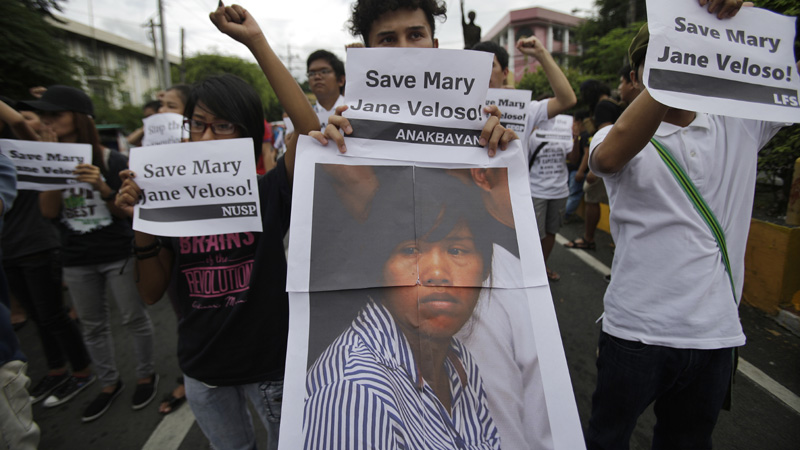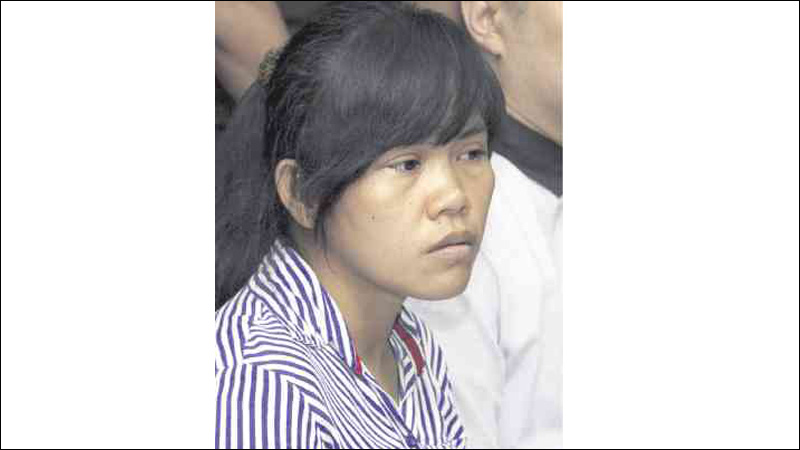Ecija judge to get Veloso’s deposition

Student protesters hold a picture of Mary Jane Veloso, a Filipino convicted drug trafficker in Indonesia, as they urge Philippine President Rodrigo Duterte to save her from execution during a rally near the Malacanang presidential palace in Manila, Philippines on Tuesday, Sept. 13, 2016. Duterte visited Indonesia last week where he discussed the fate of Veloso with his Indonesian counterpart Joko Widodo. (AP Photo/Aaron Favila)
JUDGE Anarica Castillo-Reyes, who is hearing the human trafficking charges against the suspected recruiters of convicted drug mule Mary Jane Veloso, will fly to Indonesia this month to observe Veloso’s deposition on her case from her prison cell in Jakarta, according to Veloso’s counsel.
A deposition is the testimony of a witness gathered outside the court for use in a trial.
Malacañang on Tuesday said Veloso was not about to be executed anytime soon for being a drug courier in Indonesia and that the administration would appeal for clemency for her later when the trial of her recruiters in the Philippines could help show her innocence.
Clarification
Presidential spokesperson Ernesto Abella issued the clarification amid calls for the Palace to clarify the Jakarta Post report that Mr. Duterte had told Indonesian President Joko Widodo to “please go ahead if you want to execute her (Veloso)” during their meeting in Jakarta last week.
Malacañang said on Monday that what Mr. Duterte had told Widodo was “follow your own laws, I will not interfere.”
Article continues after this advertisementAlbay Rep. Edcel Lagman said the statements of Mr. Duterte and Widodo were the same—the Filipino worker will be executed—as Vice President Leni Robredo and Sen. Leila de Lima urged the Duterte administration to “clarify” its position on the fate of Veloso.
Article continues after this advertisementIn a speech at Villamor Air Base, Mr. Duterte on Tuesday said he never mentioned Veloso during his meeting with Widodo.
The President said it would leave a “bad taste in the mouth” to beg for something from Widodo while he himself was waging a relentless campaign against illegal drugs back home.
What he told Widodo was that he thought it was a good thing that Indonesia had a death penalty, as it could bring things down to the barest minimum.
“I said ‘go ahead and implement the law.’ I never, we never, mentioned about Veloso,” Mr. Duterte said.
He also told the Indonesian leader that the Philippines would respect the judgment of Indonesian courts.
“It would have been a bad taste in the mouth to be talking about having a strong posture against drugs and here you are begging for something,” he added.
Leniency
Abella said the Duterte administration would seek leniency for Veloso if and when the Indonesian Supreme Court decided to schedule her execution.
The Indonesian government has “indefinitely” postponed her execution after it allowed her to testify in the illegal recruitment case of the people who had hired her for overseas work, he said.
This was even before the meeting between Mr. Duterte and Widodo, he noted.
It is only after Veloso played her role in the recruiters’ trial that the Indonesian Supreme Court is expected to decide on her fate, Abella said.
The outcome of her recruiter’s trial could be used to help save her, the presidential spokesperson said. “If it can be clearly seen that she’s innocent, then that could be the ground for plea for clemency.”
Consul to get deposition
The deposition will be undertaken by the Philippine consulate in Indonesia, said Veloso’s counsel, Josalee Deinla of the National Union of Peoples’ Lawyers.
Public trials require a witness to provide an oral account of his or her testimony before a judge. But the court allows deposition in cases when a witness is ill or is incarcerated like Veloso, who was found guilty of smuggling 2.2 kilograms of heroin into Yogyakarta airport in 2010.
Reyes announced her decision to go to Indonesia with the lawyers of Veloso and the accused illegal recruiters—Ma. Cristina Sergio and Julius Lacanilao—during the last trial in August. The next trial is set for Oct. 27.
Sergio and Lacanilao are on trial for qualified trafficking for allegedly enticing Veloso with an offer of a job abroad but instead making her transport illegal drugs to Indonesia.
Deinla said there was no deadline set for the resolution of the case.
“If everything goes as we’re hoping—such as the court granting leave to take the deposition with no further objections from the defense—the deposition may be undertaken within the month,” Deinla said.
Veloso was supposed to have been executed in April last year, but President Widodo postponed it, heeding the appeal of then President Benigno Aquino III to allow the Philippines time to prosecute Veloso’s alleged recruiters.
Witness vs recruiters
Aquino informed Widodo that Veloso was a vital witness against Sergio and Lacanilao.
As for reports that Mr. Duterte had given Widodo the green light to go ahead with Veloso’s execution, Abella said Mr. Duterte had said he respected the judicial process of Indonesia and would accept whatever decisions they would have on her case.
But this was assuming that Veloso’s role in the trial of her recruiter had been completed.
The Philippines would nevertheless appeal for clemency in the Indonesian Supreme Court should it decide to schedule her execution.
“If and when the Supreme Court decides to act on the execution, that would be the time to present the compelling evidence of Veloso’s innocence as a justification for a plea of clemency,” Abella said.
For Lagman, the statements of the Philippine and Indonesia leaders were one and the same.
No difference
“There is no difference between the statement of the Indonesian president and our President. The bottom line is, ‘Let the judicial processes proceed’ and he will not interfere, to ask for mercy. I think that is the bottom line of the statements,” Lagman said.
The lawmaker wondered why Mr. Duterte “honors” the Indonesian judicial processes when “he has been disregarding the judicial processes in the Philippines where drug suspects are caught and killed.”
Heartbroken
De Lima said she was “sad and heartbroken that the President will throw away all our efforts to save a life just like that, when it is still in his power to request the holding off of the execution.”
She, however, said it should no longer be a wonder that Veloso’s life may be of no worth for an administration, which has adopted judicial or extrajudicial execution as policy.
Balanga Bishop Ruperto Santos said it was “regrettable that we are now getting conflicting reports regarding the actions” of the President on the Veloso case.
Santos, chair of the Episcopal Commission for the Pastoral Care of Migrants and Itinerant People, urged the court handling Veloso’s recruiters “to pursue the case more vigorously as its resolution could help the situation” of Veloso.
“Let us continue to pray for her, that her life be spared,” he added. With reports from Tarra Quismundo, Nikko Dizon and Julie M. Aurelio
